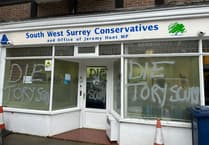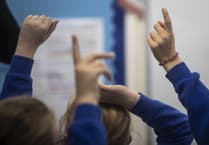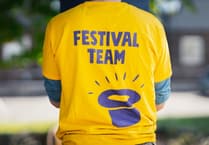IT started as a dare, and turned into an extraordinary adventure for a group of young men from Liphook - when they took a red double decker bus around the world, earning a living by performing as a band.
From their departure at The Deer’s Hut pub in September 1969, to their triumphant return in July 1972, the book Band On the Bus, written by ‘Ex-Philanderer’ Richard King, documents the epic journey, which took nine young men across Europe to Persia and Afghanistan, through the Khyber Pass to Pakistan and India, then to Australia and finally to the United States and Canada.
They became honorary citizens of Texas and hold the keys of New York, all as a result of a bet with Bert Oram, who was then landlord of their local pub at Griggs Green.
Three of the four surviving members – Richard King, Clive Hughes and Adrian Bird – were present at the Band on the Bus book launch at The Deer’s Hut, reminiscing about their legendary travels.
Richard, Adrian, Clive, as well as Dick Hayes, Alan Hughes, Bob Hall, Tim Palmer, John Wilson and Tony Hough crossed deserts and mountains in the ‘Hairy Pillock’, paying their way by singing folk songs as ‘The Philanderers’ – making numerous live appearances all across the world.
Richard told The Herald: “We all became directors of the Pillock Organisation and each of us put £150 towards the trip, giving us a starter fund of £1,350.
“We then wrote to 800 British companies offering to advertise their products on the side of the bus – 780 never replied.
“We did however get £200 to advertise Queen Anne’s Scottish whisky and a free barrel for our consumption.”
Busking and creative money making got them as far as Vienna, where they arrived during a British celebration week.
The city was decked out in Union Jacks and ‘The Philanderers’ were invited to park the bus outside Gerard’s Bar, the biggest in town, and perform, wearing their bowler hats and pin-striped suits.
Richard remembered: “We attracted a huge crowd of people and the police turned up trying to arrest us – but they soon gave up.
“None of us had any cash and we were all in the same boat. Music became a way to make friends.
“Having the bus meant we could carry our instruments with us and were never stuck for a lift.
“We were camping on the same sites as the other backpackers on the hippie-trail, who were fascinated to see us.
“In Iran, we were met by the local whiskey agent, who booked us into a club for a performance.
“Because we were company directors – we were officially on an ‘overseas trade mission’ and everywhere we went, the British Embassy helped us and even once let us park in their compound.
“We were invited out, had free dinners, we looked respectable in our pin-stripes and became kings of the road - the envy of other travellers, behaving like we were The Beatles!
“With no real sponsorship and living on a shoestring, we eventually arrived in Australia, closely followed by the bus, which was shipped across from Bombay.
“There we made a name for ourselves as singers and entertainers, appearing on radio and television, as well as giving live performances, and earning much needed money to continue our trip,” Richard added.
Eighteen months later found the bus crossing the United States, promoting the airline BOAC, the British Tourism Authority and other travel interests, again giving numerous live performances.
They became models for men’s outfitters Austen Reed, who kitted out the band with their latest trendy suits for the USA tour, and they regularly sent reports about their progress back to newspapers in the UK.
Between 1969 and 1972 “The Philanderers” visited among other places Vienna, Athens, Teheran, Kabul, Bombay, then on to Perth, Sydney, which they used as their Australian base, Brisbane, Cairns, San Francisco, Dallas, Chicago, New Orleans, Washington, New York with a brief detour to Vancouver and Anchorage, before finally returning to Liphook – two years and 10 months after their departure from The Deer’s Hut.
After the world travellers and their bus arrived back in England, they were invited to No. 10 Downing Street by then Prime Minister Ted Heath, who congratulated them on boosting the tourist industry in 1972 with more visitors than ever – from all over the world and especially the USA – coming to the United Kingdom.
They returned to a heroes welcome and a large homecoming party at The Deer’s Hut, claiming their free pints of beer.
Adrian has since become a sought-after local architect, while Clive, the entertainer of the band, carried on successfully with his musical career in America for several years, before becoming a commercial pilot and a flying instructor.
Through his connections in the airline industry, Easy Jet is currently featuring an article of the Band on the Bus in its in-flight magazine.
Richard, a retired broadcasting executive and former chairman of Kent County Council, who also made a 90-minute documentary film of the band’s journey, had the final word, saying: “We were all young at such a magical time. All of us, however we travelled, has something special in common – that spirit of adventure!”




